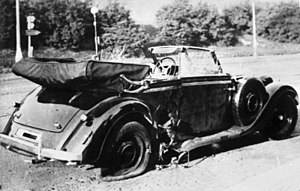Operation Anthropoid
| Operation Anthropoid | |
|---|---|
 Heydrich's Mercedes 320 Convertible B after the attack, showing the tank grenade damage |
|
| Operational scope | Assassination |
| Location |
Prague, Protectorate of Bohemia and Moravia (today Czech Republic) |
| Planned | December 1941–May 1942 |
| Planned by | Special Operations Executive |
| Target | Reinhard Heydrich |
| Date | 27 May 1942 |
| Executed by |
Jozef Gabčík Jan Kubiš |
| Outcome | Heydrich dies from his wounds, 4 June; Nazis order reprisals
|
Operation Anthropoid was the code name for the assassination of Schutzstaffel (SS)-Obergruppenführer and General der Polizei Reinhard Heydrich, head of the Reichssicherheitshauptamt (Reich Main Security Office, RSHA), the combined security services of Nazi Germany, and acting Reichsprotektor of the Protectorate of Bohemia and Moravia. The operation was carried out in Prague on 27 May 1942 after having been prepared by the British Special Operations Executive with the approval of the Czechoslovak government-in-exile. Wounded in the attack, Heydrich died of his injuries on 4 June 1942. His death led to a wave of merciless reprisals by German SS troops, including the destruction of villages and the killing of civilians. Anthropoid was the only successful assassination of a senior Nazi leader during World War II.
Heydrich was one of the most powerful men in Nazi Germany and an important figure in the rise of Adolf Hitler; as a Nazi , he was given overall charge of the so-called Final Solution (Holocaust) of the Jews in Europe. Despite the risks, the Czechoslovaks decided to undertake the operation to help confer legitimacy on Edvard Beneš's government-in-exile in London, as well as for retribution against Heydrich's harsh rule.
Heydrich had been the chief of the RSHA since September 1939 and was appointed acting Protector of Bohemia and Moravia after replacing Konstantin von Neurath in September 1941. Hitler agreed with Reichsführer-SS Heinrich Himmler and Heydrich that von Neurath's relatively lenient approach to the Czechs promoted anti-German sentiment, and encouraged anti-German resistance by strikes and sabotage.
...
Wikipedia
